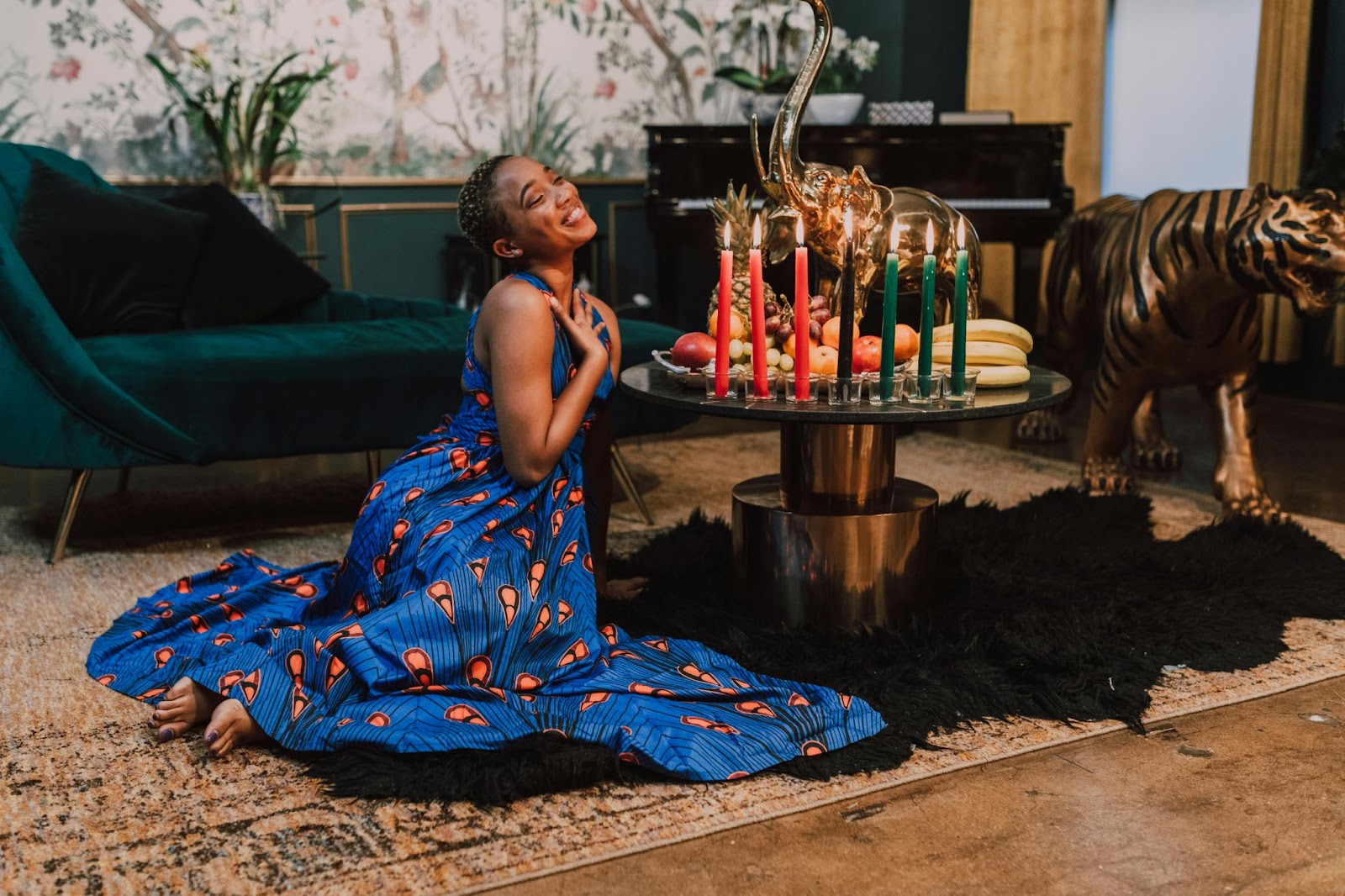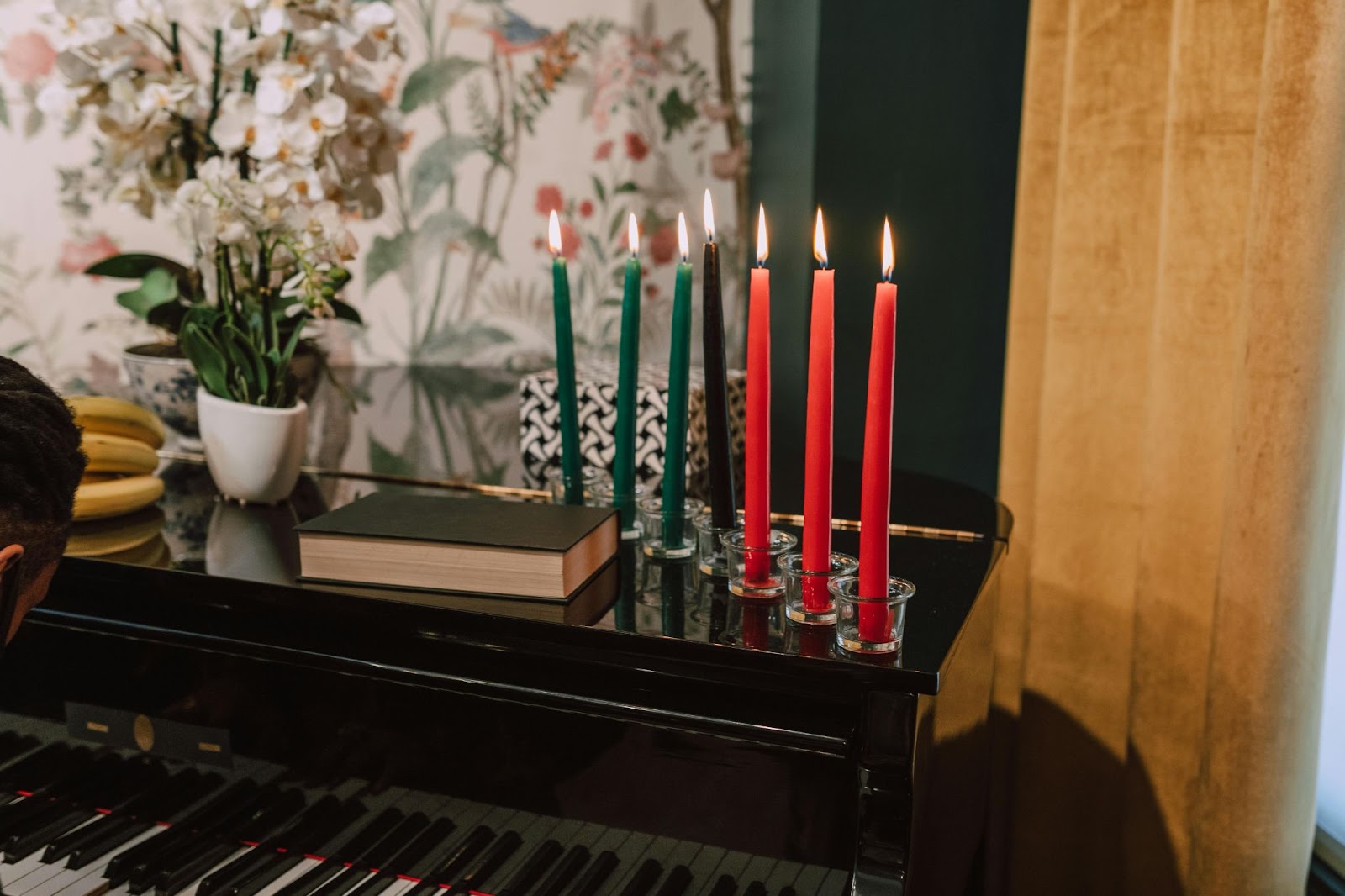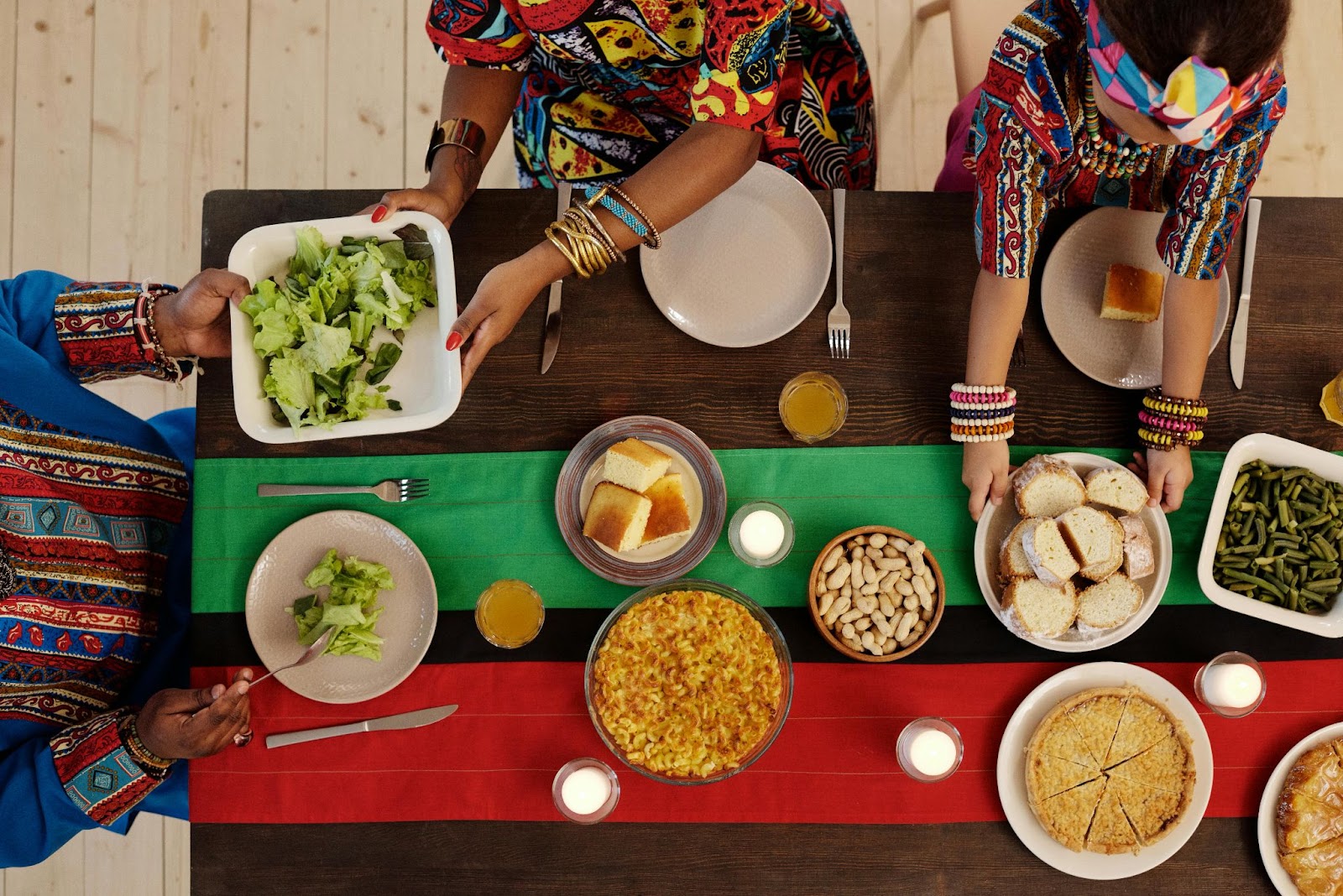Kwanzaa holiday is a celebration of African heritage, culture, and community. The holiday honors the values of unity, self-determination, and collective progress. Kwanzaa also highlights the richness of African traditions and their ongoing relevance in modern society.
Today, Kwanzaa plays an important role in instilling pride, identity, and connection within the African community. It is celebrated through storytelling, shared meals, and the symbolic lighting of the Kinara. Kwanzaa remains a unifying tradition that continues to inspire the next generation.
What is Kwanzaa?
It’s time to go a little bit deeper into Kwanzaa traditions and everything to do about this holiday.
Kwanzaa is a week-long cultural holiday. So when does Kwanzaa start?
It starts on December 26 and ends on January 1. Unlike religious holidays, Kwanzaa is all about celebrating the values of African heritage and unity. It’s an inclusive celebration for people of African descent worldwide.
Now how did Kwanzaa get its name?
The term “Kwanzaa” comes from the Swahili phrase matunda ya kwanza. It means “first fruits.” This reflects its foundation in African harvest festivals. Thus, there is a big emphasis on being thankful, on abundance, and on the importance of community.
Central to the celebration of Kwanzaa is the lighting of the Kinara. The Kinara is a seven-candle holder that symbolizes the Seven Principles of Kwanzaa (which we will cover in more detail later).
Each night, families light a candle, reflect on one principle, and have meaningful discussions. Community gatherings, storytelling, music, and the exchange of symbolic gifts are also important parts of the holiday.
What is the History of Kwanzaa?
The Kwanzaa holiday started in 1966 by Dr. Maulana Karenga, an African American professor, activist, and cultural scholar. He created the holiday during the height of the Civil Rights Movement. It draws inspiration from African traditions and values to encourage unity and pride among African people.
Kwanzaa rose from the Black Power Movement — a period marked by efforts to affirm Black identity and resist oppression. The holiday was a cultural response to hundreds of years of erasure and marginalization.
Kwanzaa gave African-Americans a way to reconnect with their heritage while building stronger communities.

How Does Kwanzaa Impact Black Culture and Identity?
Kwanzaa is the bridge to African traditions. The holiday encourages people of African descent to explore their cultural roots. Its symbols, rituals, and emphasis on community emphasize the richness of African history and traditions. It reminds participants of their shared African ancestry and values.
And in a world where the histories of marginalized groups are often overlooked, Kwanzaa is the most wonderful way to celebrate and preserve Black culture.
By centering African-inspired values and practices, it counters cultural erasure and empowers individuals to reclaim their heritage with pride.
Principles such as unity (Umoja) and self-determination (Kujichagulia) uplift Black identity. It encourages everyone participating to reflect on their contributions to society. It also inspires pride in their unique cultural perspective and it creates a sense of belonging and resilience.
Kwanzaa also has inspired creative expressions in literature, music, and visual arts. The themes on these pieces often revolve around heritage and resilience.
Many educational institutions also use Kwanzaa as an opportunity to teach about African and African-American history, which further enriches its impact on cultural awareness and understanding.
How Do You Participate in Kwanzaa?
The holiday is marked by daily rituals that emphasize reflection, gratitude, and community. A central tradition is the lighting of the Kinara. A Kinara is a candle holder with seven candles representing the Seven Principles of Kwanzaa. Each day, a candle is lit, and family members and friends discuss and reflect on the principle of the day.
Community activities are important during Kwanzaa celebrations. These can include storytelling, music, dance, and poetry. Each activity highlights African heritage and achievements. Other activities include:
- Karamu: Held on December 31, families and communities come together for feasts. During these feasts, communities and families share food, stories, and cultural expressions.
- Zawadi: Communities exchange meaningful handmade gifts. These gifts are meant to encourage personal growth and cultural pride. Popular gift choices are usually books, art, or any other item that symbolizes African culture.
And for those who are new to Kwanzaa, there are lots of books, online guides, and community events that can give more insights about the holiday’s traditions and significance.
Join in on local celebrations. You can also observe Kwanzaa at home. Both are meaningful ways to engage with Kwanzaa principles.

How to Celebrate Kwanzaa
What are the traditional symbols of Kwanzaa?
Each traditional symbol of Kwanzaa represents an important aspect of the celebration:
- The Mkeka (mat) symbolizes the foundation of heritage and traditions.
- The Kinara (candleholder) holds the Mishumaa Saba (seven candles), which represent the Seven Principles.
- The Kikombe cha Umoja (unity cup) is used during ceremonies to emphasize togetherness.
- Zawadi (gifts) represent commitments to self-improvement and mutual care. Like we’ve mentioned in the previous section, these gifts are usually handmade. These gifts honor effort and thoughtfulness.
What role do feasts play in the Kwanzaa holiday?
Karamu is the highlight of the week. Families and communities gather together to share traditional dishes, tell stories, and celebrate cultural pride. These gatherings emphasize unity, gratitude, and the joy of connection.
How have Kwanzaa celebrations evolved?
Traditional practices remain the focus. However, modern adaptations of Kwanzaa still reflect the diversity of Black experiences. A lot of families include music, poetry, and dance, while others include reflections on current events.
Social media and virtual gatherings now play a role in bringing communities together. It opens the door to broader Kwanzaa participation across the globe.
What are the 7 Principles of Kwanzaa?
Kwanzaa is built around the Nguzo Saba, or the Seven Principles. The Seven Principles of Kwanzaa serve as a guide to living a life rooted in African values, community, and self-empowerment.
Each day of Kwanzaa highlights one principle to encourage reflection and action.
Kwanzaa Day 1: Umoja
December 26 marks Umoja — day of unity. On this day, set a goal to maintain unity in the family, community, nation and race. In spite of how divisive the world gets, it's important to remember that unity is what makes a strong family, a strong community, and a strong nation.
Kwanzaa Day 2: Kujichagulia
Kujichagulia — a day that highlights self-determination. This is the day to be mindful of how you respect yourself and others. It's important to remember that a community is made up of many different people. Each member must help one another.
Kwanzaa Day 3: Ujima
Ujima — a day to reflect on collective work and responsibility. It's rooted in the sentiment of building and maintaining that community together. It’s all about helping a brother or a sister in need. Sometimes it means making certain sacrifices for the greater good.
Kwanzaa Day 4: Ujamaa
The 4th day marks Ujamaa — a day to reflect on cooperative economics. This is a day that holds professional meaning for most people. The focus is on supporting Black-owned businesses. In turn, it creates sustainable economic systems.
Kwanzaa Day 5: Nia
Nia — what is your purpose in life? This is the question to ask on the 5th day. It is the day to reflect on where you're going and what you're trying to do in life. Having a sense of purpose in life can help you find a sense of contentment, accomplishment, and personal success.
Kwanzaa Day 6: Kuumba
The 6th day, Kuumba — a day to reflect on creativity, innovation, and artistic expression. How do we use creativity to improve the world around us? What will be your legacy when you leave this world? How do we make the world or our community better?
Kwanzaa Day 7: Imani
Imani — January 1 marks the day of faith. It's important to have faith during challenging times. It's also a reminder to have faith during struggle and that there's a way to improve the society that we live in. It reinforces trust in oneself, the community, and the commitment to justice and progress.
How are these principles practiced daily?
Each day of Kwanzaa involves lighting a candle on the Kinara to honor that day’s principle. Families engage in discussions, storytelling, or activities that exemplify the chosen principle. It helps deepen understanding and application of each principle.
How can these principles guide modern life?
The Nguzo Saba extends beyond the holiday. Each principle carries lessons on building resilience, fostering inclusivity, and addressing social challenges. For instance, supporting local Black-owned businesses exemplifies Ujamaa. Another example is how Ujima is practiced through participating in community initiatives.
How Kwanzaa Connects with Other Holidays
The Kwanzaa holiday is distinct and unique in its purpose. However, it does share universal themes with other winter holidays like Christmas and Hanukkah. Gratitude, giving, and community connections are aspects that are emphasized in these holidays too.
However, Kwanzaa stands apart as a non-religious celebration. It’s rooted in African values and heritage. It also complements rather than competes with religious holidays.
Why Does Kwanzaa Matter Today and Beyond?
Kwanzaa’s relevance spans contemporary issues, global connections, and aspirations for the future. The holiday’s focus on unity, cultural pride, and self-determination provides a meaningful framework for addressing challenges like racial inequality and cultural erasure.
The values of Umoja (Unity) and Kujichagulia (Self-Determination) encourage every member of the community to fight systemic injustices. At the same time, you’re also celebrating the richness of African heritage at the same time.
Each principle of Kwanzaa also encourages a collective sense of responsibility. It inspires people to work together to build equal communities and promote Black identity in a world that often overlooks these contributions.
It’s also worth saying that social media and digital platforms play a role in improving awareness and accessibility. It lets people around the world participate in Kwanzaa and learn from the holiday.

Final Thoughts
As you reflect on the principles and practices of Kwanzaa, think of how its message of collective progress and cultural appreciation can enrich your own life. Think of how it can enrich the lives of those around you. May the spirit of Kwanzaa light the way toward a brighter, more unified future.
If you’re looking for handmade gifts or other items that can help you celebrate Kwanzaa, Africa Imports has a great selection of Kwanzaa items that you can look through.
 USD
USD  GBP
GBP  CAD
CAD  AUD
AUD 